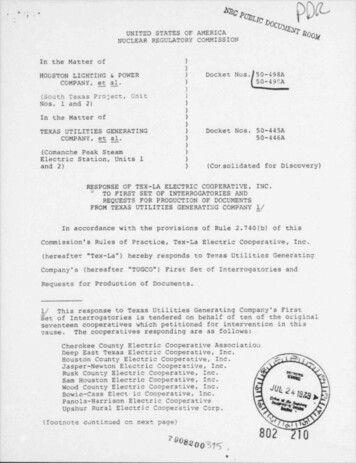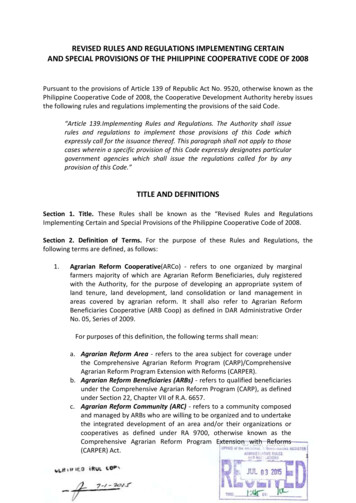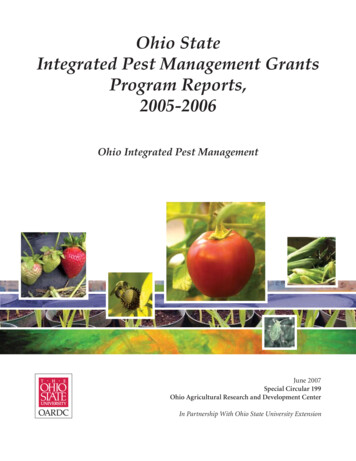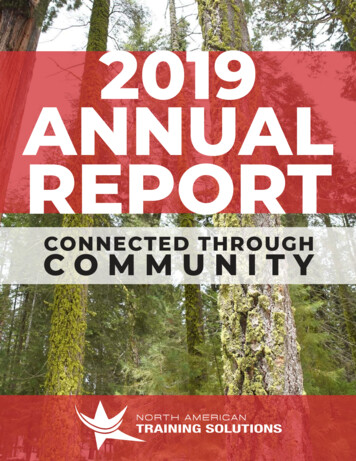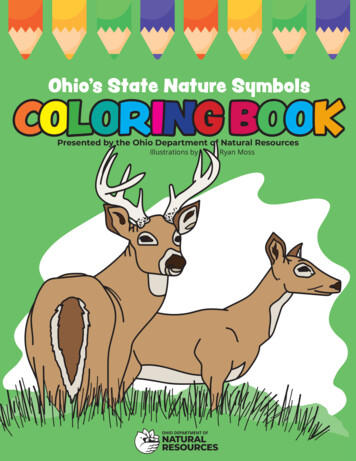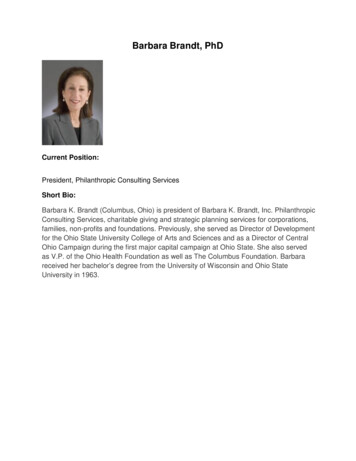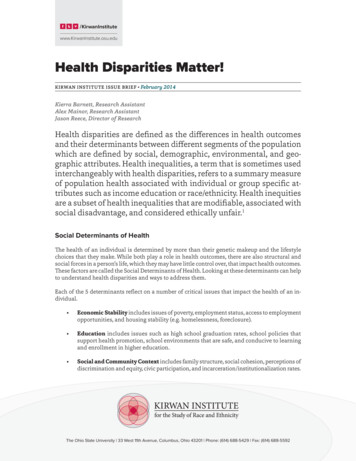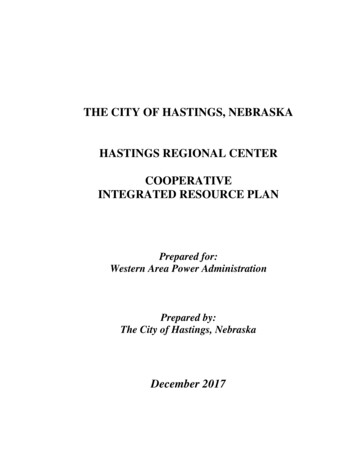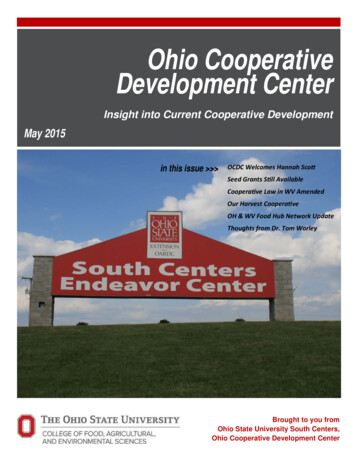
Transcription
Ohio CooperativeDevelopment CenterInsight into Current Cooperative DevelopmentMay 2015in this issue OCDC Welcomes Hannah ScoƩSeed Grants SƟll AvailableCooperaƟve Law in WV AmendedOur Harvest CooperaƟveOH & WV Food Hub Network UpdateThoughts from Dr. Tom WorleyBrought to you fromOhio State University South Centers,Ohio Cooperative Development Center
The Ohio Cooperative Development Centerworks with new and emerging cooperatives and cooperative like businesses in rural Ohio and West Virginia in aneffort to support economic development. The center provides services and resource linkages, including formationcounseling, member education, bylaw development, board training and consultation, resource linkages, and assistance with feasibility studies, strategic plan development, business planning, and policy development. OCDC strivesto provide services based on the individual needs of clients and to develop an ongoing relationship with clients toensure their continued success. For more information, visit southcenters.osu.edu/cooperatives, call 740-289-2071x227, or email scott.1220@osu.edu.Ohio CooperativeDevelopment CenterWelcomes New ProgramManagerHannah Scott began working as the program manager of theOhio Cooperative Development Center (OCDC) at Ohio StateUniversity South Centers on January 26, 2015.Hannah Scott, Program Manager, OhioCooperative Development CenterHannah was raised in Georgetown, Ohio, where she and herfamily continue to own and operate their family farm. She is a2013 graduate of Duke University where she studied sociology,psychology and documentary studies.Hannah was mostrecently a graduate associate in Ohio State’s School ofEnvironment and Natural Resources. She is earning a Master ofScience in Environment and Natural Resources with aspecialization in rural sociology. Hannah is also active with theOhio Tobacco Museum, the Duke University Center forDocumentary Studies Youth Advisory Council, and Ohio FarmBureau.Christie Welch, prior program manager of OCDC, moved into therole of Direct Marketing Specialist with OSU Extension. Sheremains based at the OSU South Centers, working withindividuals, groups, and businesses interested in directmarketing their food and agriculture products. We thank Christiefor all of her hard work with the Cooperative Development Centerand wish her luck in her new role!Christie Welch, Direct MarketingThe Ohio Cooperative Development Center is supported by the United StatesDepartment of Agriculture and The Ohio State University South Centers.Specialist, OSU Extension2
OCDC Success Story: Our Harvest CooperativeOur Harvest Cooperative is a collaborative effort started by a small, dedicated group -- namely Phil Amadon, Ellen Vera, andKristen Barker. In the spring of 2012, they formed Our Harvest Cooperative, a worker-owned cooperative focusing onsustainable agriculture and local food distribution. All have strong backgrounds in the labor movement: Ellen has been workingfor the United Food & Commercial Workers for years, and Phil was highly involved with unions throughout his career as arailroad mechanic. They wanted to find a way to help create family-sustaining jobs that could transform communities. When theUnited Steelworkers announced a historic partnership with Mondragon to launch union co-ops in the United States, the groupfelt it was just the ticket. Mondragon is the world’s most successful network of worker-owned co-ops. In the last 60 years it hasgrown from 5 worker owners to over 80,000. It is a model of a great nexus composed of many connected entities, not anisolated cooperative doing its own thing. The Our Harvest founders connected with Mondragon’s North American delegate andthe United Steelworkers; they were impressed by Mondragon’s structure and wanted to bring that concept to life in Cincinnati.Our Harvest contacted the Ohio Cooperative DevelopmentCenter (OCDC) at the Ohio State University (OSU) SouthCenters to do a feasibility study. Tom Snyder, PartnershipProgram Manager, OCDC, and Brad Bergefurd, HorticultureSpecialist, Horticulture Extension Program, conducted thestudy. Part of that study was a survey of growers fromsurrounding counties, a 150 mile radius around Cincinnati, tosee if they were interested in working with Our Harvest, if theywanted to expand their production, if they wanted to scaledown production, and what their struggles were among otherthings. Tom and Brad surveyed growers by phone and in smallfocus groups. They gathered information that was used todevelop Our Harvest’s initial business plan. The feasibilitystudy was instrumental in pointing out the best opportunities forsuccess. If Our Harvest had started only with food aggregationand distribution, it would have been a real challenge becausethey did not have enough mid-sized growers to work with atthat time. Tom and Brad suggested that Our Harvest start their own farm, which is a big piece of what Our Harvest does thatis different than a lot of traditional food hubs.According to Kristin Gangwer, Food Hub Manager, Our Harvest Cooperative, “Early in development, Tom and Brad identifiedsome gaps in the system and encouraged us to be the solution to those gaps. One gap involved the need for training the nextgeneration of growers. In partnership with Tom and Brad from the OSU South Centers, who had done a lot of work with theOhio Apprenticeship Council in developing the curriculum for that early program, Our Harvest started a pilot program. TheApprenticeship Pilot Program had two graduates from Our Harvest in 2012 that went through the program and worked on thefarm full-time. After the pilot, we partnered with Cincinnati State University to be the practicum site for their SustainableAgriculture Management Certificate Program – a connection that came as a result of our previous farmer training efforts, whichwere initiated by Tom and Brad. To help increase farmer training opportunities, Our Harvest has now created a nonprofit (theOur Harvest Research and Education Institute) to lead these efforts.”Kristin continues, “The information gathered from the feasibility study wasalso used to develop the original business plan. We started trying tocapitalize the business in 2012. We also began a small CSA from ourleased property in College Hill, the Bar Farm, that year. I came on boardwith some other staff at the end of 2012. We worked with Christie Welch,OSU OCDC, to develop a plan for the aggregation, marketing, anddistribution work for our produce and the produce from many of the otherlocal growers as part of the food hub side of the initiative. In 2013, we grewour CSA to about 200 members throughout that season, growing on 8acres and developing wholesale accounts. Last year in 2014, we grew ourCSA program to approximately 350 members. We grew produce on 15acres, increased our wholesale accounts, and developed a lot of greatrelationships. We even started selling to Whole Foods and worked withother local producers to distribute value added items like honey and salsa.”Reflecting on growth, Kristin shares, “We started farming on a second farm property last year, and this year we’ll be growing ona total of about 20 acres. We are planning to increase our CSA, which we call Our Weekly Harvest Box, to about 500members. Plans are to increase our wholesale sales five fold and we are starting to work with other farmers to incorporatetheir produce into all of our sales channels. We are also moving our packing and distribution work into a standalone, centrallylocated warehouse in Cincinnati, which will be very helpful.”Kristin expresses appreciation for OSU input, “What we have gained by working with Tom Snyder, Brad Bergefurd, andChristie Welch has been invaluable -- from the creation of the co-op, the feasibility studies, and the business planning, to theongoing guidance and resources they have shared. Tom, Brad, and Christie provide support whenever we need them, andthey continue to serve as great confidants and cheerleaders as we navigate this process.”3
Seed Grant Program Helps New and EmergingCooperativesOCDC administers a reimbursement seed grant program available togroups interested in exploring or growing a cooperative.The Ohio Cooperative Development Center (OCDC) at Ohio State UniversitySouth Centers offers reimbursement seed grants to groups interested inexploring or growing a cooperative. Over the last five program years, OCDC hasawarded over 60,000 to over 25 groups. Seed grants have been used to providetraining regarding cooperative governance, obtain professional assistance withcooperative formation including legal reviews of bylaws and articles of incorporation,and development of marketing tools and materials, among other activities.SEEDCurrently, the seed grant program for 2014-2015 is still accepting applications, with limited funds. Groups interestedin forming a new cooperative may request up to 1,500 for research and early planning, feasibility study activities, orformation services. Eligible costs may include legal and/or professional fees, focus groups, development of articlesof incorporation, and financial projections, among other preformation work. Groups that are already incorporated ascooperatives or member controlled businesses may request up to 3,000 for assistance with expansion into newmarkets and/or enterprises. Examples of eligible expenses include marketing and promotions, contract services,training and development, accounting systems, bylaw completion, and contractual document development, amongothers.This is a reimbursement program; recipients must provide 35% matching funds for project costs. Projects must becompleted prior to June 26, 2015 and proper documentation provided to OCDC by July 31, 2015 for reimbursement.For further information about the seed grant program, email Kimberly Roush at roush.143@osu.edu, call 740-2892071 x232, or go to southcenters.osu.edu/cooperatives under the Seed Grants tab to download an application.West Virginia Amends Cooperative LawThe West Virginia Food and Farm Coalition(WVFFC) was awarded a seed grant from the OhioCooperative Development Center in 2014 for usetoward legal work, workshops, and network buildingaimed at informing cooperative statute updates inWest Virginia. In addition, OCDC staff acted as aninformational resource regarding cooperatives andcooperative development for WVFFC. Thisbackground work helped inform the advocacy effortsof the WVFFC around cooperative policy updates.On March 24, 2015, West Virginia Governor EarlRay Tomblin signed Senate Bill 352, which amendsChapter 19 Article 4 of the West Virginia Code, thestate law governing cooperatives. The new lawexpands the areas in which cooperatives in the statemay operate, among other changes. Previously,West Virginia cooperatives were limited toagricultural producer and related cooperatives. As aresult of these amendments , cooperatives may alsocarry out certain qualified activities toward theprovision of goods and services such as food andbeverages, arts and crafts, woodworking, furniture-making,and recycling, composting and repurposing materials.For more information about cooperative development in WestVirginia, email Hannah Scott at scott.1220@osu.edu, call 740289-2071, or go to southcenters.osu.edu/cooperatives .4
OH & WV Food Hub NetworkUSDA defines food hubs as enterprises that aggregate locally sourced food to meet wholesale, retail, institutional,and even individual demand. The concept, and efforts to create food hubs in local communities, has gained a lot ofinterest in Ohio and West Virginia. The notion of producing more locally grown and processed food and creatingnew jobs and businesses is of interest to many communities. The opportunity is great. Approximately eight percentof the food purchased in our states is grown or processed outside our states or even outside our country. Inaddition, in state food production has not significantly increased. Without a significant increase in food production,enterprises that aggregate locally sourced food to meet wholesale, retail, institutional, and even individual demand,will find success a challenge. A webinar presented in March 2015 by the National Good Food Network releasedfindings that indicated that food hubs using a wholesale and even a hybrid of wholesale and direct-to-consumerssales models need 1.19 to 1.21 million in annual sales to breakeven and 2.36 to 2.4 million in annual sales tobecome viable. These are high marks that communities and groups need assistance to achieve.The Ohio Cooperative Development Center (OCDC) at The Ohio State University South Centers is leading aneffort to work with new and emerging food hubs and incubator or training farms. The two state Ohio and WestVirginia Food Hub Network was formed in early 2014 and currently meets face-to-face four times annually. Earlymeetings were all about getting to know each other and assessing the needs of food hub and training farm efforts.Subsequent and future meetings have been and will be about addressing those identified needs. Members alsoparticipate in other related and network sponsored projects such as: identifying network, hub, and training relatedgrant options, participating in list serve emails, and in viewing webinars.If you are interested in being part of the Ohio and West Virginia Food Hub Network in an effort to scale up yournew or emerging food hub or incubator/training farm, call 740-289-2071 x227, or email scott.1220@osu.edu.5
From the Director’s Desk Ohio State University South Centers Director, Dr. Tom Worley, reflects on OCDC’s success.Ohio Coopera ve Development Center: FiŌeen years of success!The Ohio Cooperative Development Center (OCDC) was first established at Ohio State University’s South Centers(OSU SC) in Piketon, Ohio in 2000 when initial funding was awarded from the United States Department ofAgriculture (USDA)’s Rural Cooperative Development Grants program. This nationwide program attracts competingproposals from a large majority of land grant universities during each annual cycle. It is a testament to the excellentwork and program success of the OCDC staff that OSU’s proposals have been very competitive and successfulevery year. Annual funding renewals through USDA spanning fifteen years have permitted the continual operation ofOCDC.The mission of OCDC is to “enhance rural economic development in Appalachian Ohio and other rural areas ofOhio and West Virginia by creating jobs and achieving stronger economic growth through cooperativedevelopment.” OCDC has consistently provided strong returns on USDA’s investment by assisting new andemerging cooperatives to form and continue to succeed. During the past five years, West Virginia UniversityExtension has become a partner with OCDC to provide cooperative development in many areas of the Mountainstate, especially for cooperative local foods businesses.OCDC is strategically located in Piketon, Ohio, a part of the rural, Appalachian area of the state, to have maximumeconomic impact for rural development and the areas that are in most need. OSU SC also houses several businessdevelopment programs, research and related extension service programs, and facilities, which are all used tosupport cooperative business development.OCDC’s continued success has been achieved by: Partnering with all other OSU South Centers’ programs including Aquaculture, Horticultural Crops, Soil andWater Resources and Business Development Network programs and engaging the research and Extensionexpertise of the co-located staff members Targeting program services toward interested groups and newly incorporated cooperatives including: Farmer’s markets in southeast Appalachian Ohio and West Virginia State-wide fruit and vegetable wholesale auction cooperatives Manufacturing/industrial cooperative expansion with new regional formations Cooperative food hubs Developing strong partnerships with other related community and economic development stakeholders Linking services/funding from other agencies and private entities to cooperatives Developing cooperation-among-cooperative linkages Facilitating allocation and completion of seed grant funding for groups in the early and expanding stages ofcooperative development.Ohio Coopera veDevelopment Center1864 Shyville Rd., Piketon, OH 45661Phone: 740‐289‐2071Fax: 740‐289‐4591Visit us online at:southcenters.osu.edu/coopera vesThe Ohio Coopera ve Development Center is funded, in part, byan agreement between USDA Rural Development and The OhioState University. All opinions, conclusions, or recommenda onsexpressed are those of the author(s) and do not necessary reflectthe views of the USDA.6
Agriculture Management Certificate Program - a connection that came as a result of our previous farmer training efforts, which were initiated by Tom and Brad. To help increase farmer training opportunities, Our Harvest has now created a nonprofit (the Our Harvest Research and Education Institute) to lead these efforts."
